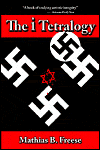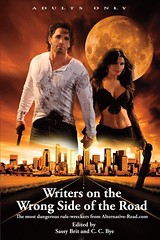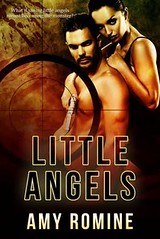256. Alternative INTERVIEW ~ with Mathias B. Freese, author of The i Tetralogy ~ Historical/Fiction ~ Hat's Off Books

Interview with Mathias B. Freese, author of The i Tetralogy ~ Historical/Fiction ~ Hat's Off Books
Conducted by Tracy-Jane Newton (Editor of Alternative-read.com).
TJN: Could you please supply our readers with an outline of your three key characters?
MBF: i is a death camp prisoner who suffers gross indignities and dehumanization of every physical and psychological kind. He is a questioning, now atheistic Jew who is religious in the sense he asks the great and significant questions his culture has imprinted upon him. In the camp his one great epiphany leads to transcendence. We come to admire, love, and care for this man with no name.
Gunther is a demonic intellectual, an unremorseful and unregenerate Nazi who lives in a fetid pool of racial rationalizations. A conditioned human being who "feels" the torture and cruelty of prisoners under his command is an express wish of the German masses, his soul has long been euthanized by the state.
Conrad is Gunther's son, and he wrestles with the chilling facts and ramifications of his father's past. Many readers identify with Conrad for he wages an oedipal struggle to be a man, to seek redemption, to clarify self, to clear a path for himself away from the transgressive behavior which defines his father. In Conrad is a morsel of hope for us all, spare that it is.
TJN: Do you find that writing about contentious issues, such as the violence the Nazis inflicted upon the Jews, has brought mixed reactions from your readers?
MBF: Is the Holocaust "contentious?" I naively ask. As the Holocaust scholar Langer has written, one need not "sweeten" it. And what are the "mixed reactions" to the war against the Jews? I write not to persuade nor to market my work. I've written a book that many would prefer not to read which is all right with me and only serves to buttress the several themes of the work. We'd all rather not know. So what else is new? As a therapist, I have experienced "resistance" on a daily basis with clients. Resistance, guilt and fear are the shrink's sworn enemies. I have learned to meet resistance not with resistance in an overpowering conflict of wills, but to join it, a Vulcan mind-meld if you will. And Tracy, that suits me just fine. I am not here to convince, the organ grinder's monkey with the Philip Morris hat. I write to express the rhapsody of a great people faced with a great calamity. I am the artist. I don't paint for you. In this cramped world, expression is my freedom. Other than the denial of death, the Holocaust evokes a very similar defence mechanism. Knowledge is death (Nietzsche).
The artist first communicates with himself and if he chooses, with an audience; but not to do the former is to produce a stillborn.
TJN: As I read your book I could feel the raw emotion in your work. Being a Jewish American yourself did you find it difficult, or painful writing from the Nazi Gunther's unremorseful point of view?
MBF: I am Gunther, the unregenerate, unremorseful Nazi. And so are you. We have it in us, as a species, to inflict pain and suffering on the other. I can taste Gunther on my lips if I choose to regress to his primitiveness. That is the latent meaning of The i Tetralogy – I touched the clammy, mossback of evil, I came close to touching the evil in myself – I could hear its husky breathing, the very heart of darkness. I do not run from that. I observe it. The observer is the observed, Krishnamurti taught. I don't work on changing it. Genetically, it is in the very DNA, species-specific. I must confess I neither found it difficult nor painful to write from Gunther's point of view. All fiction is an extension of the writer's unconscious self. Mark Twain is Huck Finn. Kafka is the roach. I don't buy into the idea that fiction is separate and apart from the writer. I hold the artist very accountable and do not separate his art out of whom he or she is. Wagner, Voltaire, T.S. Eliot, Dickens and Shakespeare test my mettle, for they all have expressed anti-semitism. It is in the fabric of Western civilization.
TJN: I particularly enjoyed reading the essay 'Raison d'Etre' at the back of the book. Is there a reason you chose to add this?
MBF: My agent suggested that I head the editors off at the pass as I made the rounds of publishing houses. If I answered their questions, often inane, often insensitive, they might consider the book. Of course, the essay became more than that. I view it as a Baedecker, perhaps a teacher's manual for the entire book – a map of my soul. I often advise readers to use it as a skeleton key to the book. I was very annoyed, as I still am, in justifying "another book" on the Holocaust, much the same thinking process that challenges evolution. Duh! It is insulting, is it not, considering the fluff that is published? In my gimlet-eyed perspective, the species is abrasive to this planet. Hold on: I love life, I love existence, but I do not enjoy being a human being. Make me a gorilla that revels in Debussy and I’d be contented.
You may recall, Tracy, that Gulliver at the end of that mordant novel is adrift on a raft and when help arrives, at first, he refuses it, so dire and dark have his travels left him. If I were his Friday on the raft, I’d wave off help as well. I abhor the herd. I abhor the conditioned mind. I am open to Thou, and no more
TJN: Has your job as a psychotherapist helped you in wriTetralogy' in any way?
MBF: Perhaps…maybe…could be. I can't answer. I am Matt Freese, who happens to be a therapist, not the other way around. Insight is a eunuch. It is both thought and feeling that bring forth an ignition. What I have learned as a therapist is to ask, to ask in all kinds of ways, to ask the very unstated question, to ask about the inner mentation we all walk about with, to ask about the gloss that runs along our living like a soundtrack on film. To answer a question with a question is acid rock Socratism for me. I am a passionate, emotional and intellectual individual, whose cast of mind is the philosophical query. I am Talmudic without being an exegete. If there were no Jewish star in Judaism, I would propose the question mark. All therapy is Talmudic.
TJN: Could you please tell me more about your therapeutic work with Holocaust survivors?
MBF: I wrote my book without their input, important to note; what I gathered from a few survivors was their joy in living. This does not deny their deltas of depression and backwaters of despair. One does come to mind. She saw me in her mid-seventies, mostly to discuss her difficulties with her aging husband who had dementia. She lived deeply – had a magnificent laugh; as an immigrant she would, from time to time, recall passing the Statue of Liberty in the harbor and the indelible impact it had upon her. She sucked the marrow out of each day’s life, bless her. She was forward looking. She had one daughter, which I see as an affirmation of life. Parenthetically, I have finished a new book in which the narrative is told by a survivor who is more depression-driven than my client. However, in identifying with this survivor I ask myself the compelling questions I feel I need to ask and in so doing I understand my self. Writing is not only cleansing but self-ish. In short, the survivor I worked with, in essence, made me reconsider who I was, no more, no less. Kosinski, author of "The Painted Bird," committed suicide in the United States years after the war, much like Primo Levi. In his sports car was discovered a valise with a passport, clothing, foodstuffs, different national currencies, shoes, et al. He drove about New York and elsewhere with his emergency "backpack" for years, haunted and hounded by what horrors I cannot even imagine.
TJN: Can you explain more about your seminars on experimental and psycho-spiritual approaches to inner awareness, please?
MBF: I have read Krishnamurti for over 25 years – just Google.com that name. His "The Awakening of Intelligence," "Think on These Things," and the profound "The Flight of the Eagle," impacted on me as a man, therapist and writer. On the media caul of our minds we have the three stooges, Dr. Wayne Dyer, Dr. Deepak Chopra and Dr. Phil, all Emersonian bullies – self-reliance, the mind as a rational Gillette razor, et al. With Krishnamurti we have the authentic teacher; in a hundred years he will be considered one of the great spiritual minds. I find it of significance that he and Kazantzakis were friends. He has helped me to see. I experience him as a nagging scruple in my psychological shoe. He keeps me deconditioned. Thus, he inspired me to explore inner awareness, and inner awareness is the engine under The i Tetralogy's hood.
TJN: How did you tackle the process of writing 'The i Tetralogy'? Do you have a creative writing routine or a favourite designated writing area?
MBF: I allow my mind to bring forth unconscious chatter. I do not plot, the story evolves. After 10 to 15 pages of outpour, I cut it back, for revision is writing. I do not censor what erupts; I've learned not to do that. I write on small yellow legal pads with pencil or fountain pen. I am not a writer you might discover in a magazine article. I am not a diva. I have written in the kitchen while the kids cavorted. I also don't buy into that writers crap about 1,000 words a day. There are no rules…learn that and set yourself free. I write when I feel compelled to express myself. I channel my unconscious – don't we all? When it comes to writing I am an autodidact – so get out of my way. We are often so hard and conditional on ourselves, all the superego shoulds sicken me. Do your thing and get off the stage for the next evolutionary creature.
TJN: Who would you say are your literary heroes and which novels would you say are personally inspirational.
MBF: Kazantzakis! A passionate, psychological and emotional genius. His "The Last Temptation of Christ," "Saint Francis," and especially his confessional, on par with Augustine's, "Report to Greco" are remarkable. After that colossus, I'd place Conrad's "The Nigger of the Narcissus," Canetti’s marvel, "The Crowd." Add Buber’s "I and Thou" as dessert.
Kazantzakis taught me to put the dew on the grape, acrid sweat in the crotch, while educating me to go for broke as an artist, "reach what you cannot." His prayer, "Overdraw me, Lord, and who cares if I break!" still makes me tremble, a call to transcendence. I want my back broken on the hard knee of spiritual transcendence. I owe the psalm that ends my novel to his inspiration.
TJN: You have a wonderful imagination. Would you mind suggesting three story 'prompts'?
MBF: That is a kind compliment. Thank you. Understand, Tracy, that The i Tetralogy is my unheard scream about man, now expressed, and it is my adieu as well. I don't think, but who knows, if I will be blessed – anointed? – to write like this again. I have grown intensely with this effort; I feel it in my bones. It's that feeling between bat and ball and knowing, feeling that hit is for extra bases. Now to the "prompts."
--So you refused out of who you are to slay the infant Hitler in his crib, are you then also guilty of crimes against humanity?
--Describe an evening of sex with Hitler, especially we now know, his proclivity to be peed and shit upon (the private as opposed to the public man).
--Become Mel Gibson's father, an inveterate Holocaust denier. What sweet nothings did he share with the young Gibson about Jews?
TJN: They're great! Thank you. Are you currently working on any other writing projects that you would like to share with us?
MBF: I have been working on a science fiction novel on and off for two decades. It is marinated in Freudian juice as I explore a primitive creature's Bildungsroman as he heads towards his own apotheosis. It is about, like all my books, inner awareness, to be "felt" as a person, to be moved by empathy and human closeness.
TJN: And finally, where can we buy your book 'The i Tetralogy'?
MBF: Email me at ifreese@hotmail.com. Home address: 10 E. Camino de Diana, Green Valley, Arizona 85614, USA. 520.399.0413. Reviews are on Amazon and Barnes and Noble. A phenomenal review by a poet/editor (25 pages!) is on www.subtletea.com. If you want a free book, because that is what I am about, dear reader, you need earn it, otherwise it would have no worth. So, write me a letter in ink, sharing some mild intimacy about yourself so we can connect as people. Pay postage and I'll send you the book. In this way, we personalize the relationship.
TJN: Thank you for sharing your open and honest thoughts and feelings with us. It's been a pleasure to speak with you and a most enjoyable interview. Good luck with all your future endeavours. Please do keep us informed how your science fiction novel progresses.
~*~*~*~*~*~*~*~*~*~*~*~*~*~*~*~*~*~*~*~*~*~
Technorati Tags:
~*~*~*~*~*~*~*~*~*~*~*~*~*~*~*~*~*~*~*~*~*~
Book Reviews,
Competitions,
Interview,
Author,
Blog,
Mathias Freese,
i Tetralogy ,
Historical Fiction,
alternative-read.com.
Click to join An_Alternative_View
~*~*~*~*~*~*~*~*~*~*~*~*~*~*~*~*~*~*~*~*~*~
256. Alternative INTERVIEW ~ with Mathias B. Freese, author of The i Tetralogy ~ Historical/Fiction ~ Hat's Off Books
![256. Alternative INTERVIEW ~ with Mathias B. Freese, author of The i Tetralogy ~ Historical/Fiction ~ Hat's Off Books]() Reviewed by Sassy Brit @ Alternative-Read.com
on
4:15 pm
Rating:
Reviewed by Sassy Brit @ Alternative-Read.com
on
4:15 pm
Rating:








No comments:
Thanks for taking the time to leave a sassy comment. It's truly appreciated. I aim to get back to you as soon as possible -- Sassy :)